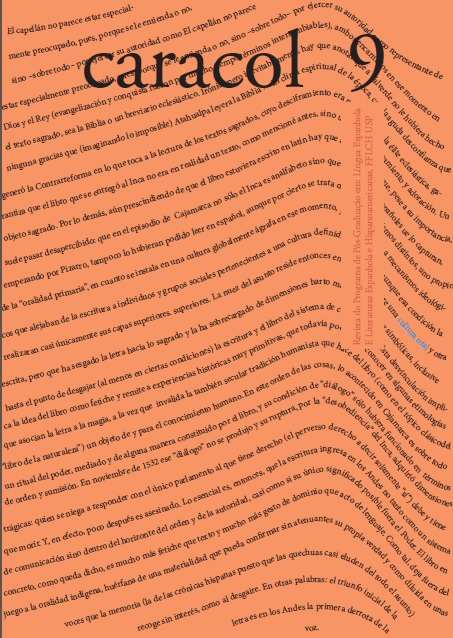A dead man’s trajectory: literature and violence in Julio Ortega’s Adiós Ayacucho
DOI:
https://doi.org/10.11606/issn.2317-9651.v1i9p344-361Keywords:
Peruvian narrative, internal war in Peru, farce, civil rightsAbstract
Emerged from a magazine photograph, a shattered corpse acquires the survival of the language. It is an illegible corpse, which can only talk in death. Its parodic enunciation evades the complicities of representation that characterize the Peruvian internal war discourse. It is a puppet facing the unrepresentativeness of violence and it builds its itinerary as a clash with the power discourse, which includes anthropology, media, politics (literature and the critic are also compromised by an intellectual discourse as a means of domination). They promote oblivion as a solution for development. As a new Antigone, this corpse claims for its missing members: in the mass graves, in the memories and in the common sense. In this scenario, the afterlife changes its ministers and regions, and acquires a civil sense, of present and community invention.
Downloads
References
Adorno, Rolena. Guaman Poma. Writing and resistance in Colonial Peru. Austin: University of Texas Press, 2000.
Arguedas, José María. “Mitos quéchuas poshispánicos”. In: Formación de una cultura nacional indoamericana. México: Siglo XXI, 1989.
Badiou, Alain. Justicia, filosofia y literatura. Rosario: Homo Sapiens, 2007.
Benjamin, Walter. “Sobre o conceito da história”. In: O anjo da história. Tradução de João Barrento. Belo Horizonte: Autêntica, 2012.
Cornejo Polar, Antonio. “El indigenismo y las literaturas heterogéneas. Su doble estatuto sociocultural”. In: Sobre literatura y crítica latinoamericanas. Caracas: Universidad Central de Venezuela, 1982.
Dameane, Carla. A encenação do sujeito e da cosmogonia andinos no teatro peruano. Texto inédito a ser publicado brevemente pela UFMG.
López-Baralt, Mercedes. Para decir al Otro. Literatura y Antropología en nuestra América. Madrid/Frankfurt am Main: Iberoamericana/Vervuert, 2005.
Ortega, Julio. Adiós Ayacucho. Lima: Fondo Editorial UNMSM; Yuyachkani, 2008.
Rivera Cusicanqui, Silvia. Ch’ixinakax utxiwa: una reflexión sobre prácticas y discursos descolonizadores. Buenos Aires: Tinta Limón, 2010.
__________. “Mito, olvido y trauma colonial. Formas elementales de resistencia cultural en la región andina de Bolivia”. In: La biblioteca 12, 2012, 388-401.
Roas, David. A ameaça do fantástico. São Paulo: UNESP, 2014.
Roncagliolo, Santiago. Abril Rojo. Lima: Alfaguara, 2006.
Spivak, Gayatri Ch. “Tradução como cultura”. In: Ilha do desterro 48, 2005, 41-64.
Ubilluz, Juan Carlos; Hibbett, Alexandra; Vich, Víctor. Contra el sueño de los justos: la literatura peruana ante la violencia política. Lima: IEP, 2009.
Downloads
Published
Issue
Section
License
Authors who publish in this journal agree to the following terms:
- Authors retain copyright and grant the journal the right of first publication, with the work simultaneously licensed under a Creative Commons Attribution License, which permits the dissemination of the work with recognition of authorship and initial publication in this journal.
- Authors are allowed to enter into additional contracts separately for non-exclusive use of the version of the work published in this journal (such as publication in an institutional repository or as a book chapter), with recognition of authorship and initial publication in this journal.
- Authors are allowed and encouraged to publish and distribute their work online (e.g., in institutional repositories or on their personal page) at any point before or during the editorial process, as this can generate productive changes, as well as increasing the impact and citation of the published work (see The effect of open access…).




